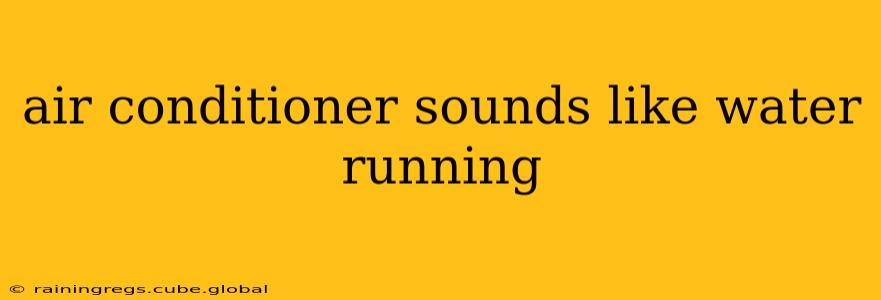Is your air conditioner making a sound like water running? This isn't always a cause for immediate alarm, but it's definitely a sign that something might be amiss. Ignoring the issue could lead to more significant problems down the line, potentially costing you more in repairs or even leading to system failure. This guide will help you diagnose the source of the sound and determine the best course of action.
Why Does My AC Sound Like Water Running?
The "water running" sound in your air conditioner often stems from refrigerant issues, condensation drainage problems, or fan motor malfunctions. Let's explore each possibility:
1. Refrigerant Leaks:
A hissing or bubbling sound alongside the water running noise could indicate a refrigerant leak. Refrigerant is crucial for cooling, and its loss drastically impacts efficiency and can damage the compressor. The "water" sound might be the refrigerant itself escaping under pressure, or it could be the sound of the system working harder to compensate for the lack of refrigerant. This is a serious issue requiring professional attention. Attempting DIY repairs on a refrigerant leak is dangerous and can void warranties.
2. Clogged or Frozen Condensate Drain Line:
Air conditioners produce condensation as they cool the air. This water typically drains away through a condensate drain line. If this line becomes clogged with dirt, algae, or mineral deposits, the water can back up, leading to a gurgling or running water sound. Furthermore, a blockage can cause ice to form, restricting airflow and potentially damaging components. This is often a simpler fix than refrigerant issues.
3. Faulty Condensation Pump:
Some air conditioners, especially those in areas with limited drainage options, use a condensate pump to force the water away. If this pump fails, water may accumulate and create the sound of water running, or even lead to overflows. Again, you'll likely hear gurgling or sloshing sounds along with the running water.
4. Fan Motor Problems:
While less common, a malfunctioning fan motor can sometimes produce a sound that's misinterpreted as water running. This is especially true if the fan is rubbing against something or has loose components. You might hear a whirring or grinding noise alongside the water sound.
How to Troubleshoot the "Water Running" Sound in Your AC
Here's a step-by-step approach to help you identify the cause:
1. Check the Condensate Drain Line:
Locate the condensate drain line (often a PVC pipe) and check for any visible blockages. If it's accessible, try clearing it gently with a plumbing snake or compressed air. Be cautious and avoid damaging the line.
2. Inspect the Condensation Pan:
Look for excess water in the condensation pan (usually located in the air handler). If it's full, this is a clear sign of a drainage problem.
3. Listen Carefully to the Sound:
Pay close attention to the exact location and nature of the sound. Is it a consistent gurgle, a high-pitched hiss, or a more mechanical whirring? This will give you clues about the underlying problem.
4. Check for Refrigerant Leaks (Leave this to professionals):
Do not attempt to inspect for refrigerant leaks yourself. Refrigerant is under high pressure and can cause serious injury. Contact a qualified HVAC technician.
5. Examine the Condensation Pump (if applicable):
If your system uses a condensate pump, check its operation. Listen for unusual noises or signs of malfunction.
When to Call a Professional
If you've tried basic troubleshooting and the sound persists, or if you suspect a refrigerant leak or a more serious mechanical issue, it's best to contact a qualified HVAC technician. Attempting complex repairs without the proper knowledge and equipment can worsen the problem and potentially void your warranty. A professional can accurately diagnose the issue and perform the necessary repairs safely and efficiently.
This information is for guidance only and does not constitute professional HVAC advice. Always consult a qualified technician for diagnosis and repair of your air conditioning system.
